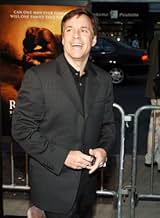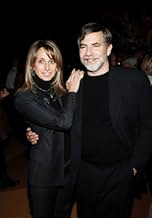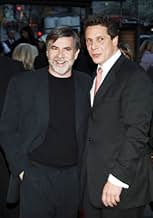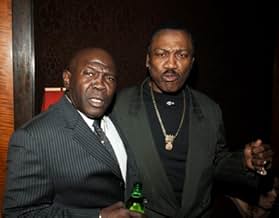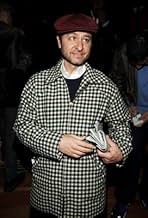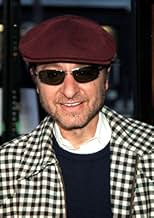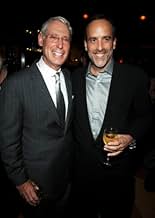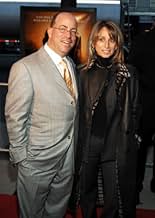Ajouter une intrigue dans votre langueA story of violence, love, sex, politics and media centered around the life of Griffith, a six-time world welterweight champion.A story of violence, love, sex, politics and media centered around the life of Griffith, a six-time world welterweight champion.A story of violence, love, sex, politics and media centered around the life of Griffith, a six-time world welterweight champion.
- Prix
- 2 nominations au total
Avis en vedette
The film "Ring of Fire" centers around the three historic Emile Griffith Benny "Kid" Paret Welterweights Championship bouts. The first taking place in Miami Beach on April 1, 1961 with Griffith looking sluggish and behind on points suddenly coming to life and wrestled the championship belt away from Paret flooring him in the 13th round with a double left hood followed by a straight right putting the champ on Queer Street. The second championship fight between the two welterweights took place on September 30, 1961 in New York's old Madison Square Garden and went the full 15, the distance, rounds. Paret surprising many fight fans in attendance and watching on TV by winning a split decision and regaining the championship that he lost to Griffith six months earlier.
As the two fighters were about to weigh in on the eve of their rubber match again in the Garden on March 24, 1962 bad blood had developed between the two pugilists to the point where they almost had it out right there and then at the weigh in before he match. Paret started needling Griffith, more to disrupt his concentration on the fight then anything else, about his sexuality calling him a "queer or homosexual", to put it mildly, in Spanish. These uncalled for remarks on Paret's part really started to get under Griffith's skin as well as enraged and set him off later in the ring.
In the fight there was no love lost between the two with both Griffith and Paret slugging it out toe to toe for eleven rounds. Griffith earlier in the sixth was knocked down, for the first time in his professional boxing career, by a devastating one two right left combination by a revitalized Paret. Paret then started slowly taking control of the fight in the middle and later rounds and leading on points, in the opinion of many at ringside, as the fateful and fatal 12th round started.
The 12th round for the most part was uneventful until with about a minute left Griffith suddenly caught Paret with a hooking solid right that stunned him knocking him into the ropes. Before Paret could counter or even cover up Griffith swarmed all over him like a windmill with two dozen punches with Paret not throwing a single one in return. Paret was left unconscious and propped up against the ropes with the fight stopped by referee Ruby Goldstein with 51 seconds left in the round. Benny "Kid" Parets skull was so baldly battered that he, ten days later, died in Roosevealt Hospital from a massive blood clot without regaining consciousness.
Even though were shown what Emile Griffith did in his boxing career since his last fight with Benny "Kid" Paret it was that fight that haunted him for the rest of his days in and out of the ring. The Paret fatal boxing match not only had caused Griffith to lose his killer instinct in the ring but may very well have caused him to become an alcoholic. It wasn't Until he met with Benny "Kid" Parets son some 40 years later and with Benny Jr kindness love and understanding that Griffith finally made peace with himself. Brutal but extremely moving documentary about a brutal sport Professional Boxing and those who participate in it both in and out of the ring.
Mrs. Paret left a widow with an infant son Benny Jr. after her husbands untimely death has never really recovered from the shock that took Benny Sr. away from her on March 24, or really officially April 4, 1962. It's only her son Benny Jr. whom we see at the end of the movie finally meeting face to face with the man Emile Griffith who was responsible for his fathers death. The scene between the two is one of most emotionally packed encounters even put on the big or small screen that no amount of acting could possibly duplicated.
Emile Griffith himself had suffered his fair amount of tragedies since his final battle with Benny Paret. Not only losing the championship belt that he took from the fallen champion that terrible night but losing almost everything that he won in the ring leaving him broke. Later after getting a job helping out young men in prison to go straight and, if they have any talent, pursue a boxing career he himself was almost beaten to death in 1992. That's when Griffith was brutally attacked one evening, leaving dead drunk from a NYC bar, and robbed by a gang of thugs who beat the 55 year-old ex-champ to the point that he almost died from kidney failure.
We get to see in the end how Emile Griffith finally got closer from the demons that had been tormenting him ever since that horrible evening some 45 years ago when he should have been celebrating the biggest victory he ever won in the ring. Griffith instead went into a long tail-spin that didn't seem to ever end. It wasn't until he finally got to see and talk to the son, Benny Paret Jr, of the person he killed that night in he boxing ring that his life took a sudden turn for the better. It's then that he saw that forgiveness from Benny Jr is far more powerful then the hate that he had for his dad that not only lead to the psychical death of Benny "Kid" Paret but, until he finally got to talk to Benny Jr, the spiritual and emotional death of himself as well.
As the two fighters were about to weigh in on the eve of their rubber match again in the Garden on March 24, 1962 bad blood had developed between the two pugilists to the point where they almost had it out right there and then at the weigh in before he match. Paret started needling Griffith, more to disrupt his concentration on the fight then anything else, about his sexuality calling him a "queer or homosexual", to put it mildly, in Spanish. These uncalled for remarks on Paret's part really started to get under Griffith's skin as well as enraged and set him off later in the ring.
In the fight there was no love lost between the two with both Griffith and Paret slugging it out toe to toe for eleven rounds. Griffith earlier in the sixth was knocked down, for the first time in his professional boxing career, by a devastating one two right left combination by a revitalized Paret. Paret then started slowly taking control of the fight in the middle and later rounds and leading on points, in the opinion of many at ringside, as the fateful and fatal 12th round started.
The 12th round for the most part was uneventful until with about a minute left Griffith suddenly caught Paret with a hooking solid right that stunned him knocking him into the ropes. Before Paret could counter or even cover up Griffith swarmed all over him like a windmill with two dozen punches with Paret not throwing a single one in return. Paret was left unconscious and propped up against the ropes with the fight stopped by referee Ruby Goldstein with 51 seconds left in the round. Benny "Kid" Parets skull was so baldly battered that he, ten days later, died in Roosevealt Hospital from a massive blood clot without regaining consciousness.
Even though were shown what Emile Griffith did in his boxing career since his last fight with Benny "Kid" Paret it was that fight that haunted him for the rest of his days in and out of the ring. The Paret fatal boxing match not only had caused Griffith to lose his killer instinct in the ring but may very well have caused him to become an alcoholic. It wasn't Until he met with Benny "Kid" Parets son some 40 years later and with Benny Jr kindness love and understanding that Griffith finally made peace with himself. Brutal but extremely moving documentary about a brutal sport Professional Boxing and those who participate in it both in and out of the ring.
Mrs. Paret left a widow with an infant son Benny Jr. after her husbands untimely death has never really recovered from the shock that took Benny Sr. away from her on March 24, or really officially April 4, 1962. It's only her son Benny Jr. whom we see at the end of the movie finally meeting face to face with the man Emile Griffith who was responsible for his fathers death. The scene between the two is one of most emotionally packed encounters even put on the big or small screen that no amount of acting could possibly duplicated.
Emile Griffith himself had suffered his fair amount of tragedies since his final battle with Benny Paret. Not only losing the championship belt that he took from the fallen champion that terrible night but losing almost everything that he won in the ring leaving him broke. Later after getting a job helping out young men in prison to go straight and, if they have any talent, pursue a boxing career he himself was almost beaten to death in 1992. That's when Griffith was brutally attacked one evening, leaving dead drunk from a NYC bar, and robbed by a gang of thugs who beat the 55 year-old ex-champ to the point that he almost died from kidney failure.
We get to see in the end how Emile Griffith finally got closer from the demons that had been tormenting him ever since that horrible evening some 45 years ago when he should have been celebrating the biggest victory he ever won in the ring. Griffith instead went into a long tail-spin that didn't seem to ever end. It wasn't until he finally got to see and talk to the son, Benny Paret Jr, of the person he killed that night in he boxing ring that his life took a sudden turn for the better. It's then that he saw that forgiveness from Benny Jr is far more powerful then the hate that he had for his dad that not only lead to the psychical death of Benny "Kid" Paret but, until he finally got to talk to Benny Jr, the spiritual and emotional death of himself as well.
"Ring of Fire: The Emile Griffith Story" is documentary film-making at its best. This lean, ninety-minute program presents a compelling human drama, as well as a thoughtful meditation on the sport of boxing.
I was age 12 at the time of the tragic ring death of Benny "The Kid" Paret, and I can still vividly recall the graphic images and descriptions in the newspapers in 1962. But it was not until the year 2005 and this powerful documentary film that I learned that Emile Griffith is a decent man who was often vilified in the media. This film helps to set the record straight about the tragic death of Paret and the exceptional character of Emile Griffith. The most moving scene in the film is when, many years after the fight, Griffith meets Benny Paret's son and asks for his forgiveness.
With the passing of over forty years since Paret's death, it is surprising that the "sport" of boxing continues to titillate fans. At least there are no longer the grueling fifteen round bouts, and today the referees will step in to end a fight sooner than in past eras of boxing.
"Ring of Fire" is brilliant in allowing the documentary film footage of the Griffth-Paret fight to speak for itself, thus allowing the viewers to draw their own conclusions about the entertainment values of boxing.
I was age 12 at the time of the tragic ring death of Benny "The Kid" Paret, and I can still vividly recall the graphic images and descriptions in the newspapers in 1962. But it was not until the year 2005 and this powerful documentary film that I learned that Emile Griffith is a decent man who was often vilified in the media. This film helps to set the record straight about the tragic death of Paret and the exceptional character of Emile Griffith. The most moving scene in the film is when, many years after the fight, Griffith meets Benny Paret's son and asks for his forgiveness.
With the passing of over forty years since Paret's death, it is surprising that the "sport" of boxing continues to titillate fans. At least there are no longer the grueling fifteen round bouts, and today the referees will step in to end a fight sooner than in past eras of boxing.
"Ring of Fire" is brilliant in allowing the documentary film footage of the Griffth-Paret fight to speak for itself, thus allowing the viewers to draw their own conclusions about the entertainment values of boxing.
I'd probably never have known about "Ring of Fire: The Emile Griffith Story" had a friend not told me about it, nor would I have been inclined to watch it were it not for my being able to consistently trust his recommendations.
Despite its subject matter (which I would normally find less-than-intriguing), I thought it was extraordinarily well-done. The contemporary music selections and newsreel clips were well chosen and added immeasurably to the mise en scene. And that final reconciliation scene between Griffith and the son of the boxer who died after fighting Griffith packed a well-earned emotional wallop.
Griffith is a sad case - certainly not meant for the career that ultimately pretty much destroyed his life. He seems a person of genuine charm and a certain gentleness - not what many might associate with the personality of a champion professional boxer. I was surprised how, in the final sequences, the makers didn't shrink from discussing the gay aspect of the story, even while Griffith seems to still be disavowing that he's actually gay.
The widow of Benny "The Kid" Paret was quite a camera subject, very expressive, and Sadie Griffith, Emile's left-behind wife, is still quite a dazzler - what a smile! (Though that close-cropped hairdo wasn't very flattering.)
Previously I knew nothing about Griffith and his story and was certainly grateful that the USA Network chose to show it uninterrupted, since I suspect that I may not have stayed with it had it been constantly cut into for the usual number of commercials.
I have a complaint about the title, though. "Ring of Fire" has been used a number of times, including for an Andrew and Virginia Stone potboiler from 1961, released by M-G-M. (IMDb erroneously says the aspect ratio is 2.35:1, but I saw it in a theater and it was not a widescreen movie). It starred the then-popular David Janssen and was filmed in Metrocolor in and around Vernonia, Oregon, not too far from where I now live. I thought the documentary makers ought to have come up with something more original and, perhaps, a trifle more appropriate to Griffith's sad story.
I understand, from the Message Boards on this film's IMDb title site that the story may be filmed by Paramount (in conjunction with the USA Network) as a major motion picture. They should leave well enough alone, especially since I can imagine the rap "star" or some other currently "hot" black personality who'll probably get the title role. Sean "P. Diddy" Combs, perhaps. Puh-LEEZ!
Despite its subject matter (which I would normally find less-than-intriguing), I thought it was extraordinarily well-done. The contemporary music selections and newsreel clips were well chosen and added immeasurably to the mise en scene. And that final reconciliation scene between Griffith and the son of the boxer who died after fighting Griffith packed a well-earned emotional wallop.
Griffith is a sad case - certainly not meant for the career that ultimately pretty much destroyed his life. He seems a person of genuine charm and a certain gentleness - not what many might associate with the personality of a champion professional boxer. I was surprised how, in the final sequences, the makers didn't shrink from discussing the gay aspect of the story, even while Griffith seems to still be disavowing that he's actually gay.
The widow of Benny "The Kid" Paret was quite a camera subject, very expressive, and Sadie Griffith, Emile's left-behind wife, is still quite a dazzler - what a smile! (Though that close-cropped hairdo wasn't very flattering.)
Previously I knew nothing about Griffith and his story and was certainly grateful that the USA Network chose to show it uninterrupted, since I suspect that I may not have stayed with it had it been constantly cut into for the usual number of commercials.
I have a complaint about the title, though. "Ring of Fire" has been used a number of times, including for an Andrew and Virginia Stone potboiler from 1961, released by M-G-M. (IMDb erroneously says the aspect ratio is 2.35:1, but I saw it in a theater and it was not a widescreen movie). It starred the then-popular David Janssen and was filmed in Metrocolor in and around Vernonia, Oregon, not too far from where I now live. I thought the documentary makers ought to have come up with something more original and, perhaps, a trifle more appropriate to Griffith's sad story.
I understand, from the Message Boards on this film's IMDb title site that the story may be filmed by Paramount (in conjunction with the USA Network) as a major motion picture. They should leave well enough alone, especially since I can imagine the rap "star" or some other currently "hot" black personality who'll probably get the title role. Sean "P. Diddy" Combs, perhaps. Puh-LEEZ!
10zelley-1
As an amateur boxer in the Sixties, it was always great to watch some of the great boxers in action, and Emile Griffith was a Champion of Champions.
It was also sad for Emile to be part of the burden of the tragedy in1962.
OVER THE YEARS IT WAS GREAT TO WATCH HIS BOUTS WITH THE LIKES OF Joey Archer and many others.
Watching the Emile Griffith story was like a trip down Memory Lane with a positive ending. To see Emile and Benny Paret Jr. together in the closing scenes was like seeing some dark clouds being gently blown away by a breath of fresh air.
Throughout the show it was great to see old faces from the past such as Gene Fullmer, Gaspar Ortega, Jose Torres, but most of all to see Griffith in action within the ring and his life beyond the limelight.
A river of tears,teardrop by lonely teardrop, can never wash away the pain and sorrow for the Paret family and their loss. But, to have Benny Jr. join together with Emile Griffith in their meeting was the highest and brightest moment of movie magic.
I can't rate or compare Ring of Fire: The Emile Griffith Story to any other movie, TV show or slice of history. It stands alone as a unique treasure with endless value.
It was also sad for Emile to be part of the burden of the tragedy in1962.
OVER THE YEARS IT WAS GREAT TO WATCH HIS BOUTS WITH THE LIKES OF Joey Archer and many others.
Watching the Emile Griffith story was like a trip down Memory Lane with a positive ending. To see Emile and Benny Paret Jr. together in the closing scenes was like seeing some dark clouds being gently blown away by a breath of fresh air.
Throughout the show it was great to see old faces from the past such as Gene Fullmer, Gaspar Ortega, Jose Torres, but most of all to see Griffith in action within the ring and his life beyond the limelight.
A river of tears,teardrop by lonely teardrop, can never wash away the pain and sorrow for the Paret family and their loss. But, to have Benny Jr. join together with Emile Griffith in their meeting was the highest and brightest moment of movie magic.
I can't rate or compare Ring of Fire: The Emile Griffith Story to any other movie, TV show or slice of history. It stands alone as a unique treasure with endless value.
Intelligent, interesting and occasionally moving, this tells the story of boxer Emile Griffith, a gentle warrior, who accidentally killed a man in the ring, and who may have been gay at a time (the early 60s on) when an admission of that by an athlete was unthinkable.
Indeed, one of the frustrating and sad things about the film is that Griffith still insists on keeping his sexuality mysterious, which keeps the film from deeply exploring a potentially very powerful part of Griffith's story. It feels awkward that the subject is so front and center in some ways (he was mocked with a slur for being homosexual by the man he beat to death in the ring), yet so danced around in others.
But there's plenty here to hold your interest. Griffith's career arc, his jovial, likable personality, the great use of archival footage, the emotional and career complexities of taking a life all make for a documentary that while perhaps not all it could be (and a bit repetitive at times) is still very worth watching.
Indeed, one of the frustrating and sad things about the film is that Griffith still insists on keeping his sexuality mysterious, which keeps the film from deeply exploring a potentially very powerful part of Griffith's story. It feels awkward that the subject is so front and center in some ways (he was mocked with a slur for being homosexual by the man he beat to death in the ring), yet so danced around in others.
But there's plenty here to hold your interest. Griffith's career arc, his jovial, likable personality, the great use of archival footage, the emotional and career complexities of taking a life all make for a documentary that while perhaps not all it could be (and a bit repetitive at times) is still very worth watching.
Le saviez-vous
- AnecdotesThroughout the entire documentary, no mention at all is made of Benny Paret's second son Alberto, born three months after Benny's death.
Meilleurs choix
Connectez-vous pour évaluer et surveiller les recommandations personnalisées
Détails
- Date de sortie
- Pays d’origine
- Site officiel
- Langue
- Consultez plus de crédits d'entreprise sur IMDbPro
- Durée1 heure 27 minutes
- Couleur
Contribuer à cette page
Suggérer une modification ou ajouter du contenu manquant

Lacune principale
By what name was Ring of Fire: The Emile Griffith Story (2005) officially released in Canada in English?
Répondre
